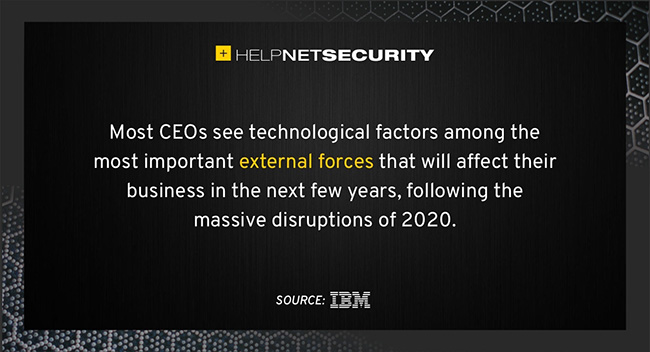Empowering a remote workforce is a top priority for CEOs
A top challenge for many CEOs over the next few years is managing a remote workforce, a new IBM Institute for Business Value (IBV) study reveals.

CEOs of outperforming organizations – those who were in the top 20 percent for revenue growth of those surveyed – are prioritizing talent, technology and partnerships to position their companies for success post-COVID-19 pandemic.
Empowering employees in the hybrid workplace
The study found the majority of CEOs surveyed reported empowering a remote workforce was their top priority during 2020. Half of outperforming company CEOs surveyed said managing a remote “anywhere” workforce is a top leadership challenge over the next few years, compared to 25 percent of underperformers, companies in the bottom 20 percent for revenue growth of those surveyed.
“The COVID-19 pandemic challenged many leaders to focus on what’s essential, like their people,” said Mark Foster, SVP, IBM Services.
“Many employees’ expectations of their employers have significantly changed. The ‘anywhere’ workforce can require leaders to provide agile technology, to adopt more empathetic leadership models that prioritize employee well-being and to champion flexible and inclusive cultures.”
In addition, 77 percent of outperforming company CEOs surveyed report they plan to prioritize employee well-being even if it affects near-term profitability, compared to 39 percent of underperformers, reflecting that the surveyed leaders of top organizations are heavily focused on their people in this moment.
Leaders should consider carefully the longer-term challenge of a hybrid work environment, which can include things like providing employees with digital, cloud-enabled tools for collaboration, preventing employee burnout or sustaining company culture with focus on diversity and inclusion.
- Voluntary attrition: In a related IBV survey of more than 14,000 global consumers, one in four employees surveyed reported they are planning to change employers in 2021, citing the need for a more flexible work schedule or location as a top reason why.
- Diversity: Only 17 percent of CEOs surveyed ranked diversity and inclusion among the most important organizational attributes for engaging employees.
Scalable and flexible technology foundations
The IBV study also revealed that the majority of CEOs surveyed see technological factors among the most important external forces that will affect their business in the next few years, following the massive disruptions of 2020.
Across the board, surveyed CEOs said cloud, AI and IoT were the top technologies that they believe can deliver benefits for their business. However, outperforming company CEOs surveyed said technology foundations were the top challenge at double the rate of underperformers.
Growing importance of partnerships
Outperforming company CEOs are also more focused on partnerships, according to the IBV study. 63 percent of outperforming CEOs surveyed said partnerships have become more important for driving business performance while only about half as many underperformers said the same.
Based on the results of this study, the thesis is that outperforming company CEOs are narrowing their focus to what they do best and relying on partners and ecosystems for access to broader ideas and innovation opportunities.
In addition, as many leaders increasingly see how their organizations can help address interconnected global issues like climate change, ecosystems may be able to play a pivotal role in driving lasting change.